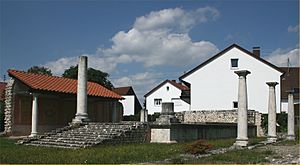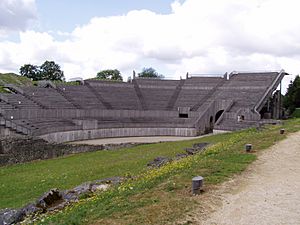Grannus facts for kids
Grannus was an important Celtic god from ancient times. People often thought of him as the same god as the Roman god Apollo, calling him Apollo Grannus. He was frequently worshipped with other gods, especially Sirona, who was a goddess of healing. Sometimes, he was also worshipped with Mars and other deities.
Contents
What's in a Name?
Where the Name Grannus Comes From
The name Grannus is a Latin way of saying the Gaulish name Grannos. You can find similar names in old personal names like Grania and in place names like Aachen. Aachen used to be called Aquae Granni, which means 'Waters of Grannus'.
Experts have different ideas about what the name means. Some think it might be linked to words meaning 'beard' or 'chin'. However, Grannus is not usually shown with a beard in old pictures.
Another idea connects the name to words meaning 'heat'. This makes sense because Grannus was often linked to the sun's heat and its power to heal. Think of how the sun's warmth can make you feel better!
Special Titles for Grannus
Sometimes, Grannus was given special titles or nicknames. These are called epithets.
- At a place called Monthelon, he was called Deus Apollo Grannus Amarcolitanus. This might mean "The one with a piercing or far-reaching look."
- At Horbourg-Wihr, he was known as Apollo Grannus Mogounus.
When Grannus was worshipped alongside Roman gods, he was always connected to Apollo. This was probably because Apollo was also seen as a god of healing and the sun. In the city of Trier, he was even called Apollo Grannus Phoebus, linking him to Apollo's bright, sunny side.
Places Where Grannus Was Worshipped

One of the most famous places where Grannus was worshipped was at Aquae Granni. Today, this city is known as Aachen in Germany. The name Aachen means 'water' in an old German language. This is because Aachen is famous for its hot springs. These springs have very warm water, between 45°C and 75°C! People have used these hot springs for healing since ancient times.
The Roman Emperor Caracalla (who lived from 188 AD to 217 AD) once visited a shrine of Apollo Grannus. This was in 213 AD, when he was feeling sick. He hoped the god would help him get better. He made many offerings to the god, hoping for healing.
A Special Festival
An old Latin writing from the 1st century AD, found in Limoges, talks about a special festival for Grannus. It was a ten-night festival, called decamnoctiacis Granni.
The writing says:
- POSTVMVS DV[M]
- NORIGIS F(ilius) VERG(obretus) AQV
- AM MARTIAM DECAM
- NOCTIACIS GRANNI D(e) S(ua) P(ecunia) D(edit)
This means: "Postumus, the son of Dumnorix, who was a leader (a vergobretus), gave money from his own pocket to build the Aqua Martia (a water system) for the ten-night festival of Grannus." This shows how important Grannus and his festival were to the people.
Gods Worshipped with Grannus
Grannus was often worshipped alongside other gods. This shows that people believed different gods worked together.
- In Augsburg, he was worshipped with Diana (goddess of the hunt) and Sirona (goddess of healing).
- He was also invoked with Sirona in places like Rome, Bitburg, and Lauingen.
- At a place called Ennetach, he was worshipped with Nymphs, who are nature spirits.
- At Faimingen, he was with Hygieia (goddess of health) and the Mother of the Gods.
- In Grand, he was worshipped with Sol, the Roman sun god.
- An altar in Astorga mentions him after "holy Serapis" and "the many-named Isis", and before "the unvanquished Core and Mars Sagatus". This shows he was part of a wider group of gods.
 | Calvin Brent |
 | Walter T. Bailey |
 | Martha Cassell Thompson |
 | Alberta Jeannette Cassell |



